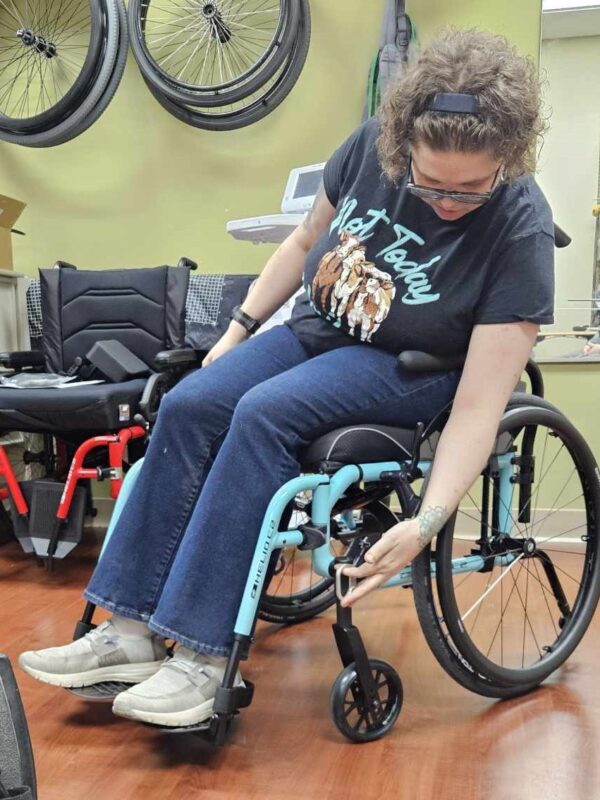When pride stands in the way of progress
Accepting a new wheelchair reminds me of some important lessons of MG
Written by |

Pride.
This short noun has many definitions, depending on its use. I’ve found two primary meanings repeatedly in various memes and articles online:
- a feeling of deep pleasure or satisfaction derived from one’s own achievements, the achievements of those with whom one is closely associated, or from qualities or possessions that are widely admired.
- consciousness of one’s own dignity.
Pride can be a motivator and a decimator. Pride in our accomplishments can keep our momentum going forward. On the flip side, being too proud to ask for help or admit when an adaptive aid would benefit us has proven time and again to be detrimental. I’ve seen it dozens of times when I interact with people across various social media platforms.
How can pride as a decimator pertain to myasthenia gravis (MG)? “Let me count the ways,” as Shakespeare said. Jokes aside, pride’s biggest detriment is to people’s ability to live their best life.
Myasthenia gravis robs me of the ability to be active for prolonged periods of time. Nonetheless, over the past two years I’ve slowly been able to increase my daily step count from 1,000 steps a day to 2,100-2,300 steps a day. That’s a vast improvement. But without using a wheelchair, I’m still unable to participate in many activities.
And that, my friends, just won’t do.
Working with ‘decimator’ pride
I don’t do idle well. Like, at all.
Thankfully, I come from a family that’s supportive and medically experienced in various ways, shapes, and forms, and I’ve benefited from that medical knowledge. My mom, for example, was able to help me accept that using a wheelchair wasn’t a bad thing. If it helped me avoid being housebound, allowed me to go to my son‘s football games, and improved my quality of life, why did I feel shame in using it as a tool?
I acquired my disabilities during my military service. I’ve always been the helper, so asking for help has never been my strong point. Combining those two things — needing help and actually asking for that help — was a hard pill to swallow.
I chose to flip the script. Rather than my pride — the “consciousness of my dignity” — stopping me from using a wheelchair, I was proud to be seen in it. It’s now a conversation starter that allows me to talk about MG without the appearance of seeking attention.
The wheelchair has become the symbol of my independence, in fact. It allows me to do things I wouldn’t otherwise be able to do.

Shawna Barnes checks out her new wheelchair. (Photo by Justin Barnes)
My old wheelchair held up for more than a decade. It’s heavy and cumbersome, with mountain bike tires. My husband usually took to pushing me in it as I was too weak to push myself for long.
A neurologist referred me to the wheelchair clinic at Veterans Affairs based on my generalized weakness from MG. I met with the occupational therapist there, who fitted me for a new carbon-fiber chair. Now this baby, I am definitely proud of!
I got to pick the color, so I got as close to MG teal as I could. It’s lightweight, probably no heavier than two gallon jugs of milk. It maneuvers easily. And it has these nifty little smart brakes that keep you from rolling backward after you push the wheel forward when you’re on a hill.
It’s pretty shnazzy.
And I’m freakin’ proud of it. At the end of April, this bright and light baby is going to allow me to travel to Maine, where I’ll be attending the Warrior PATHH program at the Travis Mills Foundation. (PATHH stands for “progressive and alternative training for helping heroes.”) I’lll be learning more about post-traumatic growth.
If you’re going to be “too proud” for something, let it be for something worthwhile. Don’t let your pride get in the way of your ability to live your best life, no matter how old you are. Use the tools available to you, including mobility aids. Now get to rollin’!
Note: Myasthenia Gravis News is strictly a news and information website about the disease. It does not provide medical advice, diagnosis, or treatment. This content is not intended to be a substitute for professional medical advice, diagnosis, or treatment. Always seek the advice of your physician or other qualified health provider with any questions you may have regarding a medical condition. Never disregard professional medical advice or delay in seeking it because of something you have read on this website. The opinions expressed in this column are not those of Myasthenia Gravis News or its parent company, Bionews, and are intended to spark discussion about issues pertaining to myasthenia gravis.



Leave a comment
Fill in the required fields to post. Your email address will not be published.